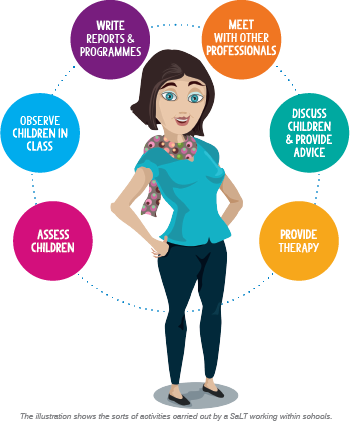The Role of the Speech and Language Therapist
Speech and Language Therapists (SaLTs) are specially trained to diagnose and treat children with disorders of speech, language and communication. Many are employed by the NHS, some are employed through the local authority and some work in independent practice. Some schools (or groups of schools) employ their own SaLT or commission therapy services from local providers.
Sadly nationally, SaLT services are often in a position where they have to ration what they can provide, due to cuts in spending. This means that local services work in very different ways and have to plan how best to use the limited resources that they have to support children, parents and education staff in their area. For many schools, this means that there may be less frequent contact and the type of support that is offered may look different, for example focusing on indirect support and training, rather than directly working with pupils. It is important that schools discuss this with their local SaLT service so the level and type of support that can be offered is understood.
The role of a SaLT involves assessing, planning, delivering and evaluating support for children with a range of SLCN. The following information outlines support that may be provided by SaLTs, but this will depend on the service in each school’s local area.
Assessment
Children are referred to SaLTs when there are concerns about speech, language and/or communication skills. Each service has criteria for children that they will accept for assessment. Once accepted, if the assessment is completed in school, the therapist will usually complete an observation of the child within the classroom and work with the child to complete formal standardised assessments. They will speak to parents and key school staff to build up information about the child’s strengths and difficulties, and the impact of any difficulties on their learning and ability to socialise. Sometimes assessments are completed within a clinic setting with the child and their parents. Children with SLCN are also assessed by a SaLT as part of an application for an Education and Health Care Plan (EHCP).
The therapist will use all of the assessment information to determine the child’s profile of needs and provide a diagnosis if appropriate. They may recommend a referral to another professional for further assessment if this is needed, for example if a child needed further assessment of their attention and listening skills. A report will be produced detailing the child’s diagnosis, difficulties, the impact of these at home and within the classroom and strategies for supporting the child. This information has usually been discussed and explained to the child’s parents and school staff. The report will also detail next steps from the SaLT service which may include recommendations for training, a programme of support, direct therapy, or discharge.

The illustration shows the sorts of activities carried out by a SaLT working within schools.
Training
Part of the role of a SaLT is to provide training and advice to school staff on supporting pupils with SLCN. This may be through organised training sessions that staff book to attend, or more specific training sessions arranged within schools. Training can also be provided to parents and carers to ensure that they understand how to support children’s speech, language and communication development at home.
Programmes of support
Following assessment, a SaLT may recommend a programme of support for a child, consisting of targets and resources for school staff to use to work with the child to develop their skills. This may be evaluated by the SaLT within school visits, including discussion with the member of staff completing the intervention programme.
Therapy
For some children with SLCN, direct therapy will be recommended following their assessment. Whether this can be provided will be dependent on the SaLT service in your area. If a child is receiving direct therapy sessions, it is important that a member of school staff working with the child is able to attend at least some of the sessions, for carry over of strategies and activities for working with the child. The child’s parents will also be encouraged to attend therapy sessions, to support carry over of work at home. Children will make the most progress when strategies for supporting them are used consistently in all of their communication environments.
Please login to view this content
Login